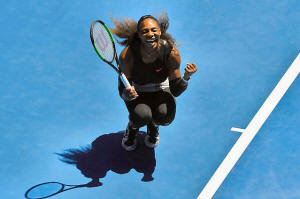|
Motherhood no obstacle for Serena's return, says Court
 Send a link to a friend
Send a link to a friend
 [April 21, 2017]
By Ian Ransom [April 21, 2017]
By Ian Ransom
MELBOURNE (Reuters) - Motherhood may do
little to slow Serena Williams's pursuit of grand slam success but
more hungry opponents, if they emerge, could yet deny her the
all-time singles record, the woman who holds that distinction told
Reuters.
Australian great Margaret Court won 24 grand slam singles titles,
one ahead of American Williams, who confirmed she was pregnant on
Wednesday and will sit out the rest of the season.
Court, 74, who straddled the sport's amateur and professional eras,
was also the first mother to win a major as a professional. She took
three of those titles in 1973, the year after giving birth to her
first child Daniel.
But she rejoined the tour at 31 while Williams would be 36 if she
came back as planned in 2018, a difference Court thought might play
a role.
"Coming back after Daniel I had one of my best years ...(but) I was
quite a few years younger (than Serena)," Court told Reuters in an
interview on Thursday.
"And I think youíve got to know physically what you can do and how
you can do it. You put the baby first and that to me was everything
at the time. But weíre all different."

The only other mothers to win slams in the Open era are Court's
compatriot Evonne Goolagong and Belgian Kim Clijsters who were both
26 when they came back.
"I don't know (if Serena can win another) ... It will depend whether
she still feels like doing it. Itíll depend on her," Court said. "It
depends whoís coming through, too."
'THERE'S NOT THE DEPTH'
On that point, Court felt women's tennis could still be at
Williams's mercy, given no players had emerged to provide a
sustained challenge to the American's dominance.
"Thereís not the depth in the womenís game like there is in the
menís. Itís not good for womenís tennis which is a shame," she said.
"Itís like they have one win and they think 'well, thatís it.'
Theyíre made. Itís a bit sad in many ways.
"It was more open in my years with Billie Jean King, (Martina)
Navratilova and (Chris) Evert-Lloyd."
Williams's "20 weeks" caption in a social media post on Wednesday
suggested she was two months' pregnant when she won her 23rd grand
slam at this year's Australian Open.
Court was also well into her term with Daniel when she lost the 1971
Wimbledon final to Goolagong. But she had no idea.
"Our first child was with me on the centre court. My coordination,
my timing was all out and I thought: Ďwhatís wrong with me?í
[to top of second column] |

Serena Williams celebrates winning her quarter-final match against
Britain's Johanna Konta. REUTERS/Jason Reed

"Balls were dropping in and I was letting them go.
Nobody knew. I went to the doctor and then I found out."
Court promptly stopped playing and was initially unsure if she would
return.
But after giving birth, the former world number one's mind was made
up and she began jogging around a park near her house with a pram to
get fit.
Court and her husband Barry juggled baby Daniel alone, and he was
often wailing in the grandstands during matches.
That situates her a world away from the comeback that, in the age of
social media and multi-million dollar celebrity endorsements, would
await Williams as a playing mother.
"It was nothing like they have today. Theyíve got the money to do
it," Court said of modern players with children.
"They could have their own planes. But we coped very well."
Marketing experts have said Williams's pregnancy will boost her
commercial appeal and open up lucrative avenues into maternal-wear
and baby clothes.
Court chuckled at the idea. "We didn't have that," she said.
"I remember Iíd signed a contract with Yamaha and it was on all the
billboards in America and they had to take them down because I
couldnít play (due to pregnancy). Different times.

"But players are very blessed in these times and they should
appreciate whatís been built before them. I donít think they should
ever forget that."
(editing by John Stonestreet) [© 2017 Thomson Reuters. All
rights reserved.]
Copyright 2017 Reuters. All rights
reserved. This material may not be published, broadcast, rewritten
or redistributed. |